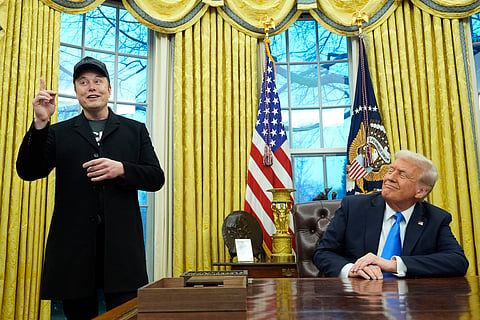Why did Elon Musk quit the Trump administration?
Billionaire exits amid clashes on tariffs, budget policy and pressure from Tesla investors

Elon Musk has formally stepped down from his role in the Trump administration, concluding a tumultuous tenure as head of the Department of Government Efficiency (DOGE). His resignation comes amid growing policy disagreements with President Donald Trump and mounting pressure from his own business circles.
Appointed as a special government employee, Musk was limited to 130 days of service per year and has now completed that term. In a statement, Musk expressed gratitude to President Trump but criticised a recent spending bill that increased the federal deficit, undermining DOGE’s mission.
Musk’s tenure at DOGE was marked by efforts to streamline federal bureaucracy, with an initial goal of cutting $2 trillion in spending. However, he faced significant resistance within the administration and widespread political opposition, ultimately achieving only $150 billion in cuts. Critics also alleged transparency violations and improper appointment procedures during his time in government.
Clashing visions on trade
Tensions had been simmering for months, but they flared publicly after President Trump announced sweeping new US tariffs targeting major trading partners, including China and the European Union. Musk, a longtime advocate of globalisation and technological openness, responded by proposing a free-trade zone between the US and Europe — a direct challenge to Trump’s protectionist trade policy.
Shortly afterward, Musk escalated matters by publicly insulting Trump’s chief economic advisor, Peter Navarro, calling him “dumber than a sack of bricks.” The insult followed Navarro’s criticism of Tesla’s global supply chain, claiming that the carmaker sourced most of its components from Asian factories. Musk responded by citing independent studies showing that Tesla produces “the most American-made cars” in the industry.
The White House attempted to tamp down the spat. Spokeswoman Karoline Leavitt brushed off the public infighting, remarking dismissively, “boys will be boys.”
“One Big, Beautiful Bill”
The final straw appears to have been President Trump’s so-called “One Big, Beautiful Bill Act,” which bundles sweeping tax relief with spending cuts and passed the House last week. While Trump touted it as a landmark achievement, Musk took a rare public stand against the Republican president.
“I was disappointed to see the massive spending bill, frankly, which increases the budget deficit, not just decreases it, and undermines the work that the DOGE team is doing,” Musk told CBS News. Critics of the legislation, including nonpartisan budget analysts, warn that it could increase the federal deficit by as much as $4 trillion over the next decade while cutting deeply into healthcare and social programs.
Musk viewed the bill as a betrayal of the very purpose of his role. Just days after voicing his discontent, he announced he was stepping down.
Complicated tenure
Musk’s time in government was always bound to attract scrutiny. Within his 130 days of service, he took on the lofty goal of streamlining the federal bureaucracy, but ran into fierce resistance both from within the administration and in Washington at large.
Transparency advocates questioned the legality of his appointment, while political opponents accused him of circumventing accountability measures. Nonetheless, Musk claims to have saved taxpayers $150 billion, though those figures remain debated.
DOGE faced internal challenges, including the resignation of over 20 civil service employees who protested against the agency’s direction under Musk’s leadership. These staffers accused DOGE of dismantling critical public services and expressed concerns about the agency’s approach to reducing government size.
Investor pressure
Simultaneously, Tesla shareholders had grown increasingly uneasy with Musk’s foray into politics. Since December 2024, Tesla stock dropped nearly 24%, prompting calls for Musk to refocus on the companies that made him a household name. In recent weeks, he reportedly admitted to underestimating how difficult government reform would be, and privately conceded that he may have neglected his business ventures.
What’s next for Musk?
Although he is stepping away from official duties, Musk is not disappearing from the political landscape. Sources close to the White House suggest he will remain an informal adviser to President Trump. Meanwhile, he’s launching a broad media and branding campaign to reposition himself as a visionary technologist, spotlighting SpaceX’s Mars missions, Tesla’s next-generation vehicles, and robotics innovation through his AI ventures.




